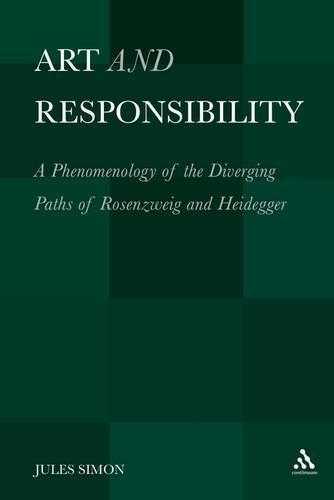
Art and Responsibility: A Phenomenology of the Diverging Paths of Rosenzweig and Heidegger
(Hardback)
Available Formats
Publishing Details
Art and Responsibility: A Phenomenology of the Diverging Paths of Rosenzweig and Heidegger
By (Author) Professor Jules Simon
Continuum Publishing Corporation
Continuum Publishing Corporation
26th May 2011
United States
Classifications
Tertiary Education
Non Fiction
Phenomenology and Existentialism
Judaism
193
Physical Properties
Hardback
304
Width 156mm, Height 234mm
Description
Two German philosophers working during the Weimar Republic in Germany, between the two World Wars, produced seminal texts that continue to resonate almost a hundred years later. Franz Rosenzweiga Jewish philosopher, and Martin Heideggera philosopher who at one time was studying to become a Catholic priest, each in their own, particular way include in their writings powerful philosophies of art that, if approached phenomenologically and ethically, provide keys to understanding their radically divergent trajectories, both biographically and for their philosophical heritage. Simon provides a close reading of some of their essential textsThe Star of Redemption for Rosenzweig and Being and Time and The Origin of the Work of Art for Heideggerin order to draw attention to how their philosophies of art can be understood to provide significant ethical directives.
Reviews
"Art and Responsibility is a sophisticated exploration of the ethical implications of the aesthetic and the aesthetic implications of the ethical. Simon explores this topic through a phenomenological investigation of the thought of Heidegger and Rosenzweig. Instead of producing an intellectual history of these thinkers, the author seeks to elicit the ethical repercussions of their philosophies of art through careful philological-textual analysis of their dense writings. The juxtaposition of these two seminal German thinkers has engendered a fascinating study that undoubtedly will provoke lively discussion and debate in the years to come." --Elliot R. Wolfson, Abraham Lieberman Professor of Hebrew and Judaic Studies, New York University, USA
Author Bio
Jules Simon is Professor of Philosophy and Director of the Center for Science, Technology, Ethics, and Policy at the University of Texas at El Paso, USA. He is the co-editor of The Double Binds of Ethics after the Holocaust: Salvaging the Fragments (2009).
